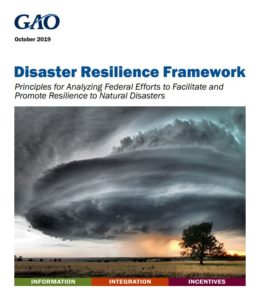
New Natural Disasters Framework improves federal preparations and response
 Since 2005, federal funding for disaster assistance is approaching half a trillion dollars, most recently for catastrophic hurricanes, flooding, wildfires and other losses in 2017 and 2018. As the number and severity of weather events continue to increase, the need for federal assistance will likely increase as well.
Since 2005, federal funding for disaster assistance is approaching half a trillion dollars, most recently for catastrophic hurricanes, flooding, wildfires and other losses in 2017 and 2018. As the number and severity of weather events continue to increase, the need for federal assistance will likely increase as well.
With this in mind, the U.S. Government Accountability Office (GAO) issued a new guide — Disaster Resilience Framework: Principles for Analyzing Federal Efforts to Facilitate and Promote Resilience to Natural Disasters — to help bolster resilience when it comes to natural disasters. The new framework is intended to help managers across the government explore opportunities to promote disaster resilience and reduce the mounting costs associated with the federal response to climate and weather disasters.
“This important new tool is designed to help federal agencies and others refine their response to the growing threat posed by natural disasters,” said Gene L. Dodaro, comptroller general of the United States and head of the GAO. “Investments in disaster resilience are a promising way to reduce the overall impact of future disasters and minimize the federal government’s fiscal exposure.”
The just-released report suggests that “requiring building codes and standards based on the best available information for infrastructure built or repaired with federal funds” given a prior GAO analysis finds that building codes play an important role in “ensuring the resilience of federal and nonfederal infrastructure to the effects of natural disasters and extreme weather.”
The disaster resilience framework is organized around three approaches or principles that managers who oversee disaster response efforts may find useful in strengthening national disaster resilience. They are: (1) accessing information that is authoritative and understandable to help decision-makers identify current and future risk and the impact of risk reduction strategies; (2) integrating analysis and planning to help decision-makers take coherent and coordinated resilience actions; and (3) providing incentives to help make long-term, forward-looking risk-reduction investments more viable and attractive among competing priorities.
Investing in disaster resilience — i.e., the ability to prepare for, recover from and adapt to disasters — can help limit damage and costs in the aftermath of a weather event. For example, elevating homes and strengthening building codes in Texas and Florida prevented greater damages during the 2017 hurricane season.
The full 24-page report is available online in PDF format.
A podcast with Chris Currie is also available to learn more about the Disaster Resilience Framework.








